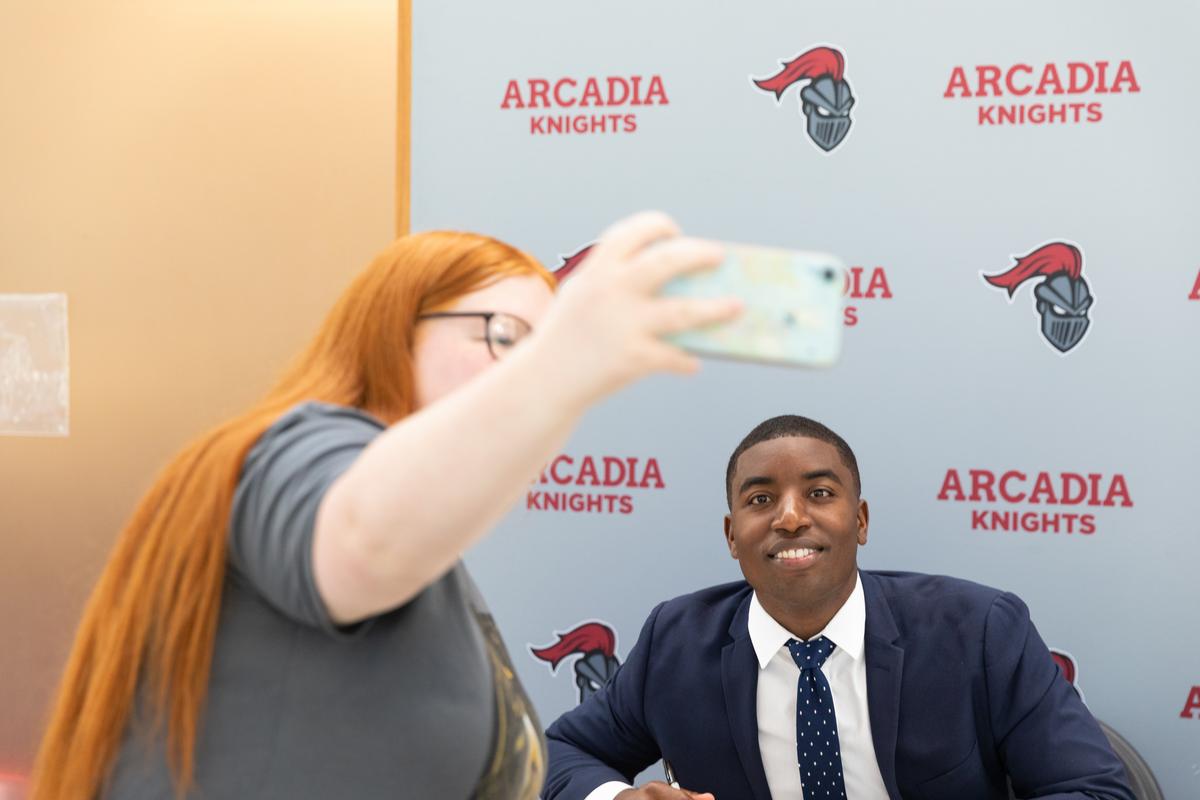Arcadia Magazine Winter 2023: A Conversation with Common Read Author Kareem Rosser
Arcadia University welcomed author Kareem Rosser to campus during Homecoming & Family Weekend on Oct. 6 for a discussion on his book and Common Read selection for first-year students, Crossing the Line: A Fearless Team of Brothers and the Sport that Changed Their Lives Forever.
Rosser and his brother Daymar were part of the Work to Ride team, the first all-Black Polo team to win the United States Polo Association’s High School National Championship in 2011. They repeated as champions the following year. Rosser then went to Colorado State and won the National Championship in 2015 and was named the U.S. Polo Association’s Intercollegiate Player of the Year.
While Rosser’s accomplishments in polo have been widely featured, including on ESPN and 60 Minutes, he wanted the whole story to be told — about his family, his upbringing at the “bottom” in Philadelphia, and what life is like for people living in poverty, where things can seem hopeless.
Q: Did you ever think you’d be here when you were living at the “bottom” in Philadelphia?
A: No. Many kids at the bottom are lucky to make it to the age of 18. A lot of them get lost in the system, whether it’s jail, dropping out of school, getting in trouble. I was just a child, and growing up there was really tough. My mother battled
addiction and dealt with abusive men that she was with. I lost one of my best friends to gun violence.
For many years, I thought I had asthma because I would have attacks where it was hard to breathe. After having my lungs checked, I learned that they were panic attacks. I suffered from those panic attacks for a long time because of how tough it was growing up and what I experienced. It was essentially PTSD. Therapy has helped a lot with it.

Q: Who do you hope to connect with?
A: The book is for everyone, but I really hope it connects with other people who grew up the way I did and young people who are growing up that way now. There’s challenges for everyone, everywhere. I want to show that you can overcome those.
Q: Was polo an outlet for you?
A: Polo and sports in general were definitely an outlet for me. It helps to remove yourself from stressful and toxic situations, as well as toxic people.
Polo isn’t exactly common in Philadelphia. And being a Black man in polo is not common — it’s basically all white. The social part was difficult at first because no one except my siblings and I looked like me or talked like me. I was always aware of race, but I felt like hating someone or being resentful of someone just because they don’t look like you is a waste of time and energy.
It was more about our background and being poor compared to being Black or white.
All the equipment my brother and I had were hand-me-downs, and we didn’t really have places to ride and practice in the city like other kids. But then conversations got easier because you’re talking to your teammates about the sport and situations that come up during the games or matches.
This has really expanded into my life now. I work in finance, and there aren’t a lot of Black people in that field. It’s some of the same dynamics.
Q: Speaking about the bottom and having an outlet, could you give your opinion on the gun violence issue in Philadelphia?
A: It’s awful. I wish I had a solution. It needs to be a priority for everyone who works for or with the City, as well as everyone living there.
I hate to say that I don’t know what the solution is, but I really don’t think there is one thing that’s going to solve it. It’s a huge problem that needs more attention and needs to be addressed.
Q: Could you talk a little bit about Work to Ride, and what your role there is now?
A: Work to Ride is a nonprofit run by Lezlie Hiner that gives young people living in the inner-city the opportunity to ride and engage with horses and nature. I serve on the Board as the treasurer and help them raise money and expand.
We have camps and riding programs; the summer camp is sold out every year, and we’re getting involved with more schools. Our long-term goal is to double our enrollment within the next five years. Publishing the book has helped with our capital campaign. We’ve raised about $10 million over the last year and a half.
Q: Do you have another book in the works?
A: I have a second book that just went to the
publisher. My first book is also being made into a film, but that is still in the early stages. I’m really excited about both and am just really thankful for everyone who helped me get to where I am.

